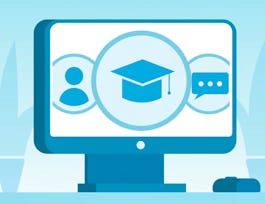Welcome to Foundations of Virtual Instruction! This course will help you 'up' your game and develop the advanced skills and techniques that elude even some of the most experienced virtual teachers in the K-12 space. Examine pitfalls and learn how to overcome them by focusing on the fundamentals that have the most significant impact on student learning in a blended or online environment. When you complete this course, you will be able to:


Foundations of Virtual Instruction
This course is part of Virtual Teacher Specialization
Taught in English
Some content may not be translated

Instructor: Cindy Carbajal
38,016 already enrolled
Included with 
Course
(1,457 reviews)
95%
Skills you'll gain
Details to know

Add to your LinkedIn profile
14 quizzes
Course
(1,457 reviews)
95%
See how employees at top companies are mastering in-demand skills

Build your subject-matter expertise
- Learn new concepts from industry experts
- Gain a foundational understanding of a subject or tool
- Develop job-relevant skills with hands-on projects
- Earn a shareable career certificate


Earn a career certificate
Add this credential to your LinkedIn profile, resume, or CV
Share it on social media and in your performance review

There are 5 modules in this course
Welcome to Module 1, The History of Virtual Instruction. In this module, we will explore the history of virtual education and the different models of virtual instruction for K-12 students.
What's included
2 videos9 readings3 quizzes1 discussion prompt
Welcome to Module 2, Synchronous and Asynchronous Technologies. This module begins with the definitions of asynchronous learning and synchronous learning and then continues with a look at tools and technologies appropriate for each. These are the two main modes for conducting online courses and as such are among the most important concepts in the world of virtual instruction.
What's included
6 readings3 quizzes2 discussion prompts
Welcome to Module 3, Transitioning from the Classroom to the Virtual Environment. Thus far, we have examined the roots of virtual instruction and the technology available for use in synchronous and asynchronous online learning. In this module, you will consider transitioning from the traditional classroom to a virtual setting. We will also explore the facilitation of instruction in an online course, the changing field of curriculum development, and the role of outside vendors. While reviewing this information, keep in mind that the purpose is to introduce you to some best practices and methods to consider when teaching online, not to master these practices yet.
What's included
6 readings3 quizzes2 discussion prompts
Welcome to Module 4, Equity and Access, Funding, and the Law. This module introduces funding, equity and access, and legal considerations that virtual teachers must keep in mind. The content in this module is geared toward what is current and relevant in the United States, however, the information may be useful and applicable internationally as well. As you review content in these three areas, reflect on the virtual teacher’s role in each area and particularly your current or future role as a virtual instructor.
What's included
5 readings4 quizzes1 discussion prompt
Welcome to Module 5, The Future of Virtual Education. Congratulations, you’ve arrived at the final module in your first course for certification in virtual instruction. We began this course by examining the history of online learning and the roots of virtual instruction. We then looked at different program models, tools of synchronous and asynchronous virtual learning, what it takes to transition from the brick and mortar classroom to the virtual classroom, and issues associated with school funding, equity and access, and other legal considerations. For our final topic, we will consider the future of K-12 virtual instruction and reflect on the material covered previously in this course.
What's included
7 readings1 quiz1 discussion prompt
Instructor

Offered by
Recommended if you're interested in Education

University of California, Irvine

University of California, Irvine

University of California, Irvine

University of California, Irvine
Why people choose Coursera for their career




Learner reviews
Showing 3 of 1457
1,457 reviews
- 5 stars
67.35%
- 4 stars
21.19%
- 3 stars
6.44%
- 2 stars
2.88%
- 1 star
2.12%

Open new doors with Coursera Plus
Unlimited access to 7,000+ world-class courses, hands-on projects, and job-ready certificate programs - all included in your subscription
Advance your career with an online degree
Earn a degree from world-class universities - 100% online
Join over 3,400 global companies that choose Coursera for Business
Upskill your employees to excel in the digital economy
Frequently asked questions
Access to lectures and assignments depends on your type of enrollment. If you take a course in audit mode, you will be able to see most course materials for free. To access graded assignments and to earn a Certificate, you will need to purchase the Certificate experience, during or after your audit. If you don't see the audit option:
The course may not offer an audit option. You can try a Free Trial instead, or apply for Financial Aid.
The course may offer 'Full Course, No Certificate' instead. This option lets you see all course materials, submit required assessments, and get a final grade. This also means that you will not be able to purchase a Certificate experience.
When you enroll in the course, you get access to all of the courses in the Specialization, and you earn a certificate when you complete the work. Your electronic Certificate will be added to your Accomplishments page - from there, you can print your Certificate or add it to your LinkedIn profile. If you only want to read and view the course content, you can audit the course for free.
If you subscribed, you get a 7-day free trial during which you can cancel at no penalty. After that, we don’t give refunds, but you can cancel your subscription at any time. See our full refund policy.

